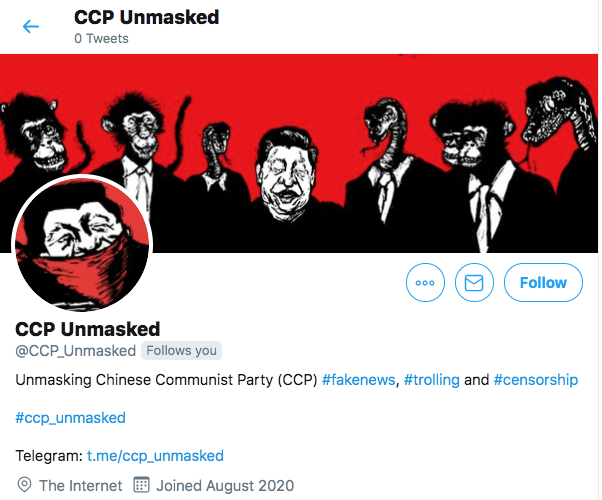A hacking group claims to have breached three Chinese tech companies responsible for the Chinese Communist Party’s (CCP) social media surveillance Saturday, with the group attempting to blast leaked documents across social media.
The hacking group, CCP Unmasked, says it infiltrated the Knowlesys, Yunrun Big Data Service, and OneSight data firms, VICE reported. The group attempted to send the information out via its Twitter account, but the platform suspended their account under its policy against hacked documents.
“We think the public deserves to know about the CCP’s attempts to undermine democracy and freedom of expression,” the hackers said in an email to VICE.
“We don’t want to become the story and we want to protect ourselves. But we can tell you that we hacked the companies,” the hackers added. “And that we did it because we think the CCP’s desire to put out fake news and interfere with democracy needs to be challenged.”

The now-suspended Twitter accounts for CCP Unmasked. (Screenshot/Twitter/VICE)
The leaked documents allegedly show a presentation by Knowlesys regarding one of its products called the “Intelligence Center,” which allows governments to track what “the opposition party” talks about and does on Facebook, Twitter, YouTube, and elsewhere. (RELATED: Big Tech, Elected Officials Mimicking China’s Surveillance Methods To Police Citizens Amid Pandemic)
Such surveillance is reportedly critical for China’s ongoing social credit system, in which citizens are assigned a rank based on how closely their lives adhere to ideals put forward by the CCP. Citizens’ social media activity is a major part of a person’s assigned credit.
The Chinese government announced the new social credit initiative in fall 2017, penalizing people for criminal behavior as well as what they buy, do, and say. The country implemented President Xi Jinping’s policy of “once untrustworthy, always restricted” approach to social engineering.
“It will forge a public opinion environment where keeping trust is glorious,” the country’s policy announcement stated. “It will strengthen sincerity in government affairs, commercial sincerity, social sincerity and the construction of judicial credibility.”
The system assigns users values between 350 and 950 points, based on five factors: credit history, ability to fulfill a contract, personal characteristics, behavior and preference, and social relationships — most of which can be tracked via social media.


